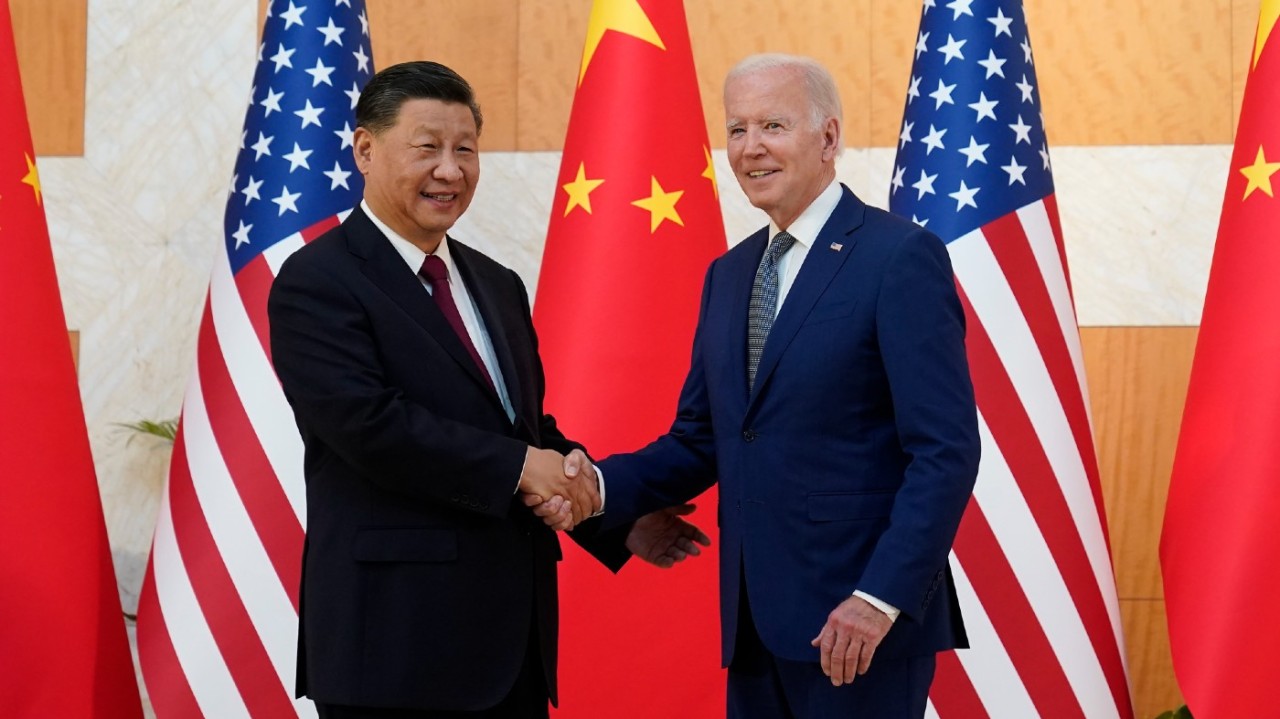
In a closely watched bilateral meeting on the world stage, President Biden voiced objections to what the White House called Beijing’s “aggressive” actions on Taiwan while telling Chinese President Xi Jinping that the U.S. policy toward the democratic island has not changed.
We’ll share details of the meeting, plus former President Trump’s latest move to try to shield records from the Department of Justice and more on Russia’s retreat from Kherson, Ukraine.
This is Defense & National Security, your nightly guide to the latest developments at the Pentagon, on Capitol Hill and beyond. For The Hill, I’m Ellen Mitchell. A friend forward this newsletter to you?
Biden to Xi: Policy toward Taiwan has not changed
President Biden on Monday said he told Chinese President Xi Jinping that the U.S. policy toward Taiwan has not changed, adding he doesn’t think there’s an imminent attempt from China to invade the democratic island.
“The One China policy, our One China policy, has not changed, has not changed. We oppose unilateral change in the status quo by either side and we’re committed to maintaining the peace and stability in the Taiwan Straits,” Biden said in a press conference following his 3 1/2-hour bilateral meeting with Xi in Bali.
The two stances: China’s government in Beijing considers Taiwan a part of its sovereign territory. The U.S. maintains a strategically ambiguous stance on the matter, and while its “One China” policy acknowledges Beijing’s sovereignty claims, the U.S. holds unofficial relations with Taiwan and is committed through the Taiwan Relations Act to ensuring the island has the means to defend itself.
No invasion ‘imminent’: “I do not think there’s any imminent attempt on the part of China to invade Taiwan,” Biden told reporters on Monday.
“It’s the same exact position we’ve had. I made it clear that we want to see cross-trade issues peacefully resolved and so it never has to come to that,” Biden added. “And I’m convinced that he understood exactly what I was saying. I understood what he was saying.”
Rising tensions: Tensions have been rising recently over Xi’s desire to see a reunification of the Chinese mainland and Taiwan. Speaker Nancy Pelosi (D-Calif.) in August became the highest-ranking U.S. official to visit Taiwan in 25 years; Beijing responded by launching a series of military drills near the island.
More on the meeting: Biden opened the bilateral meeting on Monday by saying that he and Xi have a shared responsibility to “show that China and the United States can manage our differences” and “prevent competition from becoming anything ever near conflict.”
- According to a White House readout of the meeting, Biden “laid out in detail” that the One China policy has not changed and “the world has an interest in the maintenance of peace and stability in the Taiwan Strait.”
- “He raised U.S. objections to [China’s] coercive and increasingly aggressive actions toward Taiwan, which undermine peace and stability across the Taiwan Strait and in the broader region, and jeopardize global prosperity,” the White House stated.
Also from The Hill:
Trump pushes to deem records personal property
Then-President Trump designated presidential records as personal records simply by packing them up and taking them to Mar-a-Lago, his lawyers wrote in newly unsealed court documents.
A series of documents filed over the weekend along with others unsealed Monday offer the latest glimpse into Trump’s battle to shield records from the Department of Justice (DOJ), including new evidence from the DOJ that he appeared to have handled the classified records on his property after leaving office.
The Trump team’s argument: The filing argues that the determination of whether records created during a president’s term are their personal property is largely up to the president.
“President Trump was still serving his term in office when the documents at issue were packed, transported, and delivered to his residence in Palm Beach, Florida. Thus, when he made a designation decision, he was President of the United States; his decision to retain certain records as personal is entitled to deference, and the records in question are thus presumptively personal,” Trump’s lawyers wrote in a brief.
DOJ: You can’t do that: The Justice Department countered that Trump cannot decide a record is his personal property “simply by saying so.”
Such an interpretation of the Presidential Records Act, it wrote, would “nullify the statutes entire purpose.”
Timing: The filing comes as Trump pushes to keep more than 10,000 documents from the Justice Department, a tranche that remains after records marked as classified were returned to the DOJ. The special master assigned to review the documents, Judge Raymond Dearie, asked both sides to suggest guidelines for determining which records should be turned over.
Trump’s lawyers went on to argue he should not have to prove that he designated the documents as personal, echoing similar arguments made after Trump claimed he declassified the records stored at his Florida home.
FROM THE WEEKEND
Russia’s retreat from Kherson divides Putin’s allies
Russia’s retreat last week from Kherson, Ukraine has created a rare public schism between pro-war allies of Russian President Vladimir Putin.
The withdrawal of the Kremlin’s troops from Kherson came just weeks after Putin moved to annex the strategic city, and was the third major blow to Russia’s war effort since the start of the invasion.
Some of the most prominent war hawks have defended what they describe as a strategic withdrawal, while others have offered stinging criticism of the decision.
The criticisms: Russian nationalist Alexander Dugin, dubbed “Putin’s brain,” accused Putin of failing his obligation to defend Russian cities, and drew a parallel to a story about a king killed for failing his people.
Pro-Kremlin TV presenter Vladimir Solovyov, dubbed “Putin’s voice,” delivered an angry tirade against the withdrawal from Kherson.
And pro-Russian military analyst and blogger Boris Rozhin called the retreat a “murder of Russian hopes,” according to translations from the Kyiv Post.
“This betrayal is scratched into my heart for ages,” said Rozhin.
ON TAP FOR TOMORROW
- The Institute for Defense and Government Advancement will hold a conference on “Realizing Joint All-Domain Command And Control,” at 8:45 a.m.
- The House Homeland Security Committee will hold a hearing on “Worldwide Threats to the Homeland,” with Department of Homeland Security Secretary Alejandro Mayorkas, Federal Bureau of Investigation Director Christopher Wray, and National Counterterrorism Center Director Christine Abizaid, at 9:30 a.m.
- The International Institute for Strategic Studies will hold an event: “Indo-Pacific Powers and NATO: A conversation with the Ambassadors of Australia, Japan, New Zealand and the Republic of Korea,” at 10 a.m.
- The Center for Strategic and International Studies will host a conversation on “Agriculture in Wartime: Threats and Opportunities for Ukraine,” at 10 a.m.
- The University of Maryland’s Center for International and Security Studies will hold an event on “The U.S. and the Turbulent World of Autocracy: A Discussion with Admiral Dennis Blair,” at 12 p.m.
- The American Security Project will host a talk on “The Recruiting Crisis: Obesity’s Challenge to Military Readiness,” at 12 p.m.
- The Defense Advanced Research Projects Agency Forward will hold an event on “Advancing the Horizons of National Security,” at 3 p.m.
- National Reconnaissance Office DirectorChristopher Scolese will speak at a Intelligence and National Security Alliance dinner at 5:30 p.m.
WHAT WE’RE READING
That’s it for today! Check out The Hill’s Defense and National Security pages for the latest coverage. See you tomorrow!



